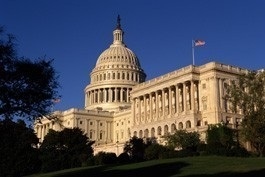 RISMEDIA, October 30, 2009—(MCT/The Wall Street Journal)-The Senate has reached a compromise on extending and expanding the $8,000 tax credit for first-time home buyers, a boost the housing industry believes will help it pull out of its two-year-old downturn.
RISMEDIA, October 30, 2009—(MCT/The Wall Street Journal)-The Senate has reached a compromise on extending and expanding the $8,000 tax credit for first-time home buyers, a boost the housing industry believes will help it pull out of its two-year-old downturn.
While its passage remains uncertain, the agreement would extend the existing credit for first-time homebuyers, worth up to $8,000, while offering a new credit of up to $6,500 for some existing homeowners, Senate aides said. The reduced credit would be available to all homebuyers who have been in their current residence for a consecutive five-year period in the past eight years. Lawmakers in Washington also raised the qualifying income limits to $125,000 for single taxpayers and $250,000 for joint taxpayers, from the current $75,000 and $150,000, housing-industry sources said. Under the Senate compromise, buyers must have sales agreements in hand by April 30, but they will have until June 30 to go to settlement, said the sources. The measure still faces votes in the full Senate and the House.
Treasury Secretary Tim Geithner and HUD Secretary Shaun Donovan are in full support of the Senate’s proposal to both extend and expand the first-time homebuyer tax credit and called on Congress to approve key housing measures that include the tax credit. “We welcome efforts taken by Congress to extend the First-Time Homebuyer Tax Credit for a limited period. This credit has brought new families into the housing market and contributed to three consecutive months of rising home prices nationwide,” said Secretaries Geithner and Donovan. “In extending the credit, we urge Congress to include strict measures to combat tax fraud and protect responsible homeowners.”
The current tax credit did little for the new-home market in September, the Commerce Department recently reported—news that took many industry analysts by surprise. Sales fell 3.6% from August and 7.8% from September 2008. Industry observers had expected a fifth consecutive monthly increase in new-home sales, believing that the tax incentive for qualified first-time buyers—credited with 357,000 sales of previously owned homes so far this year—would do the trick. Instead, sales of typically more expensive newly built houses slipped. “The decline in new-home sales seems to us to be more a function of the attractive pricing available on resales in the current environment than a reflection of weakening demand,” said Michael Feder, president of Radar Logic in New York, which tracks the market.
“Since hitting rock bottom in March, demand is up 20 percent,” said Joel L. Naroff of Naroff Economic Advisers in Holland, Pa. For Naroff, the robust rise in existing-home purchases—9.2% year over year in September—indicated that the housing market was not faltering. “Maybe the issue is supply, which fell to its lowest level in 27 years,” he said. “Builders, at least those left standing, have been making sure they don’t have any houses sitting around, and they have been very successful in controlling inventories.”
IHS Global Insight economist Patrick Newport echoed that, noting new-home inventories “sank for the 29th straight month to their lowest level since November 1982.” Naroff maintained housing has recovered enough to stand without the tax credit, but Newport said that if the credit were not extended and expanded, housing demand would take a hit, and home sales would drop.
The new provisions are aimed at broadening availability of the credit beyond first-time buyers and giving the weakened real estate market a bigger boost while preventing real estate investors from benefitting. While Senate lawmakers appear to have reached a deal on the substance of the tax credit, they are still at odds over how it would be brought to the Senate floor.
(c) 2009, The Philadelphia Inquirer.
Distributed by McClatchy-Tribune Information Services.
For more information, visit www.wsj.com.










